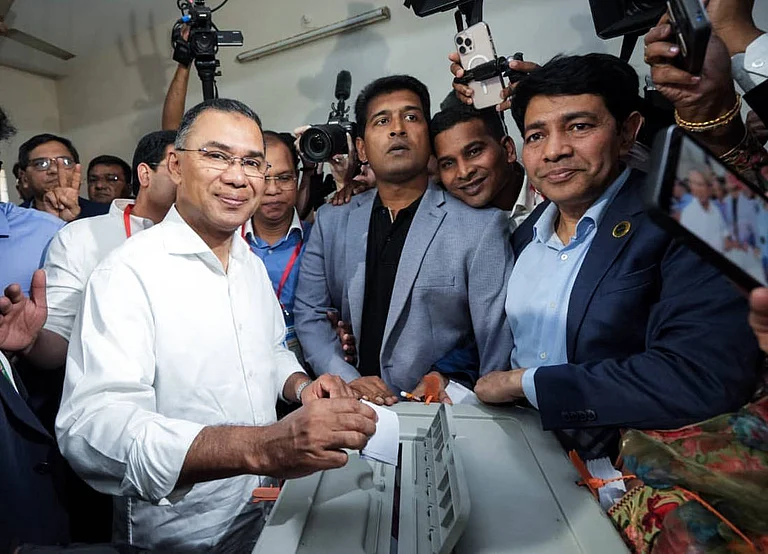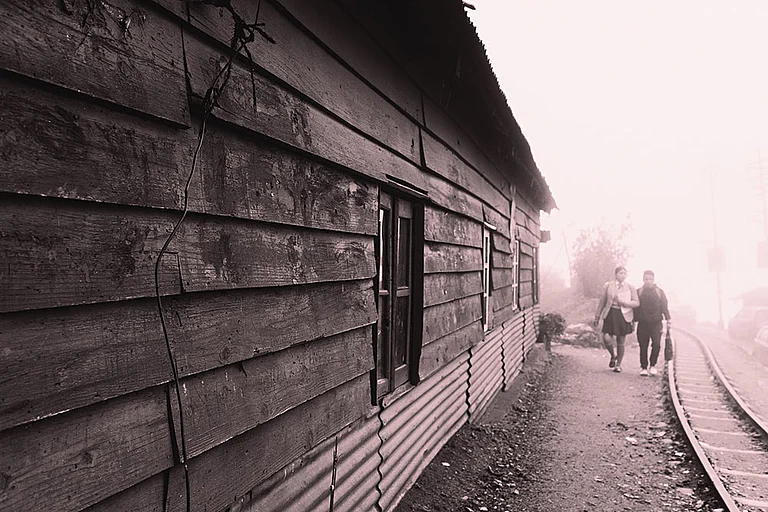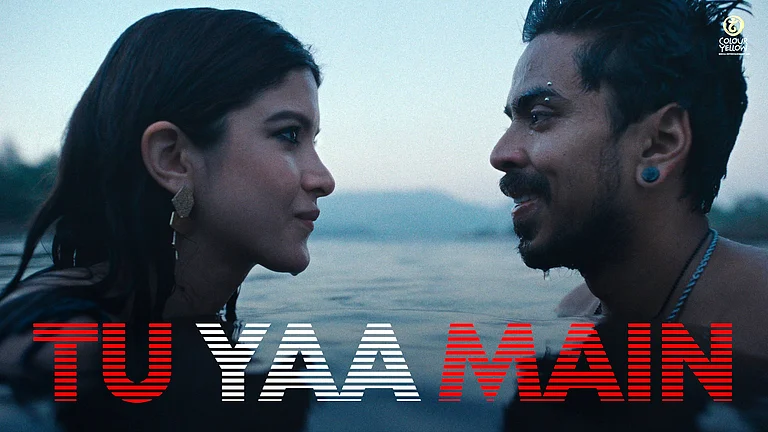I was in Calcutta for a few weeks when I heard that Chhaya Dida, an aunt of my father, had passed away. At the funeral, a nondescript middle-aged man, with a receding grey hairline and a prominent paunch, approached me.
‘Bitan, isn’t it?’ he said to me. He had recognised me from the braces on my leg.
‘Is it — is it — Ujan Kaka?! I could hardly recognise you!’
He smiled and patted me on my back, but it was just a shadow of that old brilliant smile of his.
It must have been at least twenty years since we had last met. Uncle Ujan had changed unrecognisably.
I vividly recalled the day I last saw him, when I was nine years old or so. My father had said to me at the dinner table that evening, casually,
‘Your Uncle Ujan will be staying with us this weekend.’
‘Who’s he?’ I had said. I hadn’t heard of this uncle before.
‘He is my cousin, once removed. He was in England all these years, studying chartered accountancy. He has taken up a new job in Bombay and will be staying with us for a few weeks, till the firm he will join arranges a flat for him.’
When I first saw Ujan Kahali, I gaped at him open-mouthed. He was very tall, very fair, with jet-black wavy hair, light grey eyes, aquiline features and an aristocratic jawline. He was extraordinarily handsome for a Bengali. Not just the bone structure of his face, he was athletic and graceful — he was an expert rower — and looked quite like a film star. Not at all like the image I had of what a staid accountant was supposed to look like.
He soon made friends with me. He came to my room and started flipping through my stacks of comics. ‘So, Master Bitan Kushari, what do you read, apart from Donald Duck and Superman?’
Delighted, I launched into my recital, and he (most surprisingly for a grown-up) evinced keen interest in my litany. He displayed a most gratifying knowledge of such topics of vital galactic importance as the composition of Kryptonite and the colour of Darth Vader’s light sabre.
It was he who introduced me to the world of Peter Pan and Wendy, to The Scarlet Pimpernel and Captain Nemo, and also to the classics — David Copperfield and Oliver Twist, Mowgli and the Secret Garden.
I realise now, in hindsight, how extraordinarily kind it was of him to befriend a lonely, sickly boy like me, afflicted with polio since the age of five, with no siblings and few friends. He not only read to me — this was before the days of television in India — but also brought me books ranging from Tintin and Tarzan to the Hardy Boys and Enid Blyton. He sometimes took me to film shows, when he got the time — from Charlie Chaplin and Laurel and Hardy to ‘Witch Mountain’ and ‘Born Free’.
Gradually, I became obsessed with that soft warm fuzzy feeling you got after reading ‘The Scarlet Pimpernel’, and an almost numinous mystique haloed the names of Clark Kent and Lois Lane, of Zorro and Elena de la Vega.
Those three years were an exciting, exhilarating time for me. He would often drop by since he hardly knew anyone in Bombay, and my father was more like his own brother than just his cousin. My sister Suroma had been born a few weeks ago, and my mother was busy with the baby most of the time.
I still remember my eleventh birthday as clearly as though it were yesterday.
The monsoon was due that week, and a breathless, expectant hush hung over the sunny June sky of Bombay. Soon it would be time for the rains.
The rains arrived, on its normal onset date of 7 June, and the first blue cascade washed away the sere dryness of India’s searing summer. I also remember that it was the day I put on my first full-length trousers, graduating from half-pants — and I think now, half in wonder, how little it took to make a red-letter day for me at that age!
After the showers of the first few days, the wild grasses were soon tangled and redolent, mantling the hill slopes with swathes of emerald verdure. I watched, awestruck, the explosion of green, green, green in the valley: tall tropical grasses, lantana shrubs, musk roses, and wildflowers.
My father worked in a multinational engineering company that had been established years ago in Glasgow, Cynosure Engineering. We lived on an estate of the company, a sort of finca next to its sprawling factory, on the slopes of the Sahyadri mountains in a suburb of Bombay. That was the first time I was allowed to wade through the mud on the fields, and, after a few days, I explored gardens flamboyant with gorgeous tropical flowers and orchards redolent of mango blossoms, where myositis and mimosa had come alive. The touch-me-nots shrank into themselves at my gentle affection, while forget-me-nots shook their heads, knowingly, over my innocence.
I returned home late that evening, full of gladness at being young.
Uncle Ujan had come to our home. As I learned later, this visit was for the last time. He was not his usual cheerful, jovial self: he seemed dejected, even depressed, and was lost in his own thoughts. His face had lost its colour, and wore a morose, confused look.
‘I’m leaving Bombay for good,’ he said to me, and then resumed talking to my father.
I couldn’t find anything to say — so I merely said, ‘Oh!’
At that moment I had suddenly realized my legs and thighs were itching, and I needed to scratch them desperately.
‘What’re these?’ I asked them, pointing at the tiny burrs trapped in my new trousers up to my thighs.
Uncle Ujan bent down and examined the little thorns embedded in the fabric of my corduroy pants. ‘These are called 'chor kanta' in Bengali, meaning the “thief thorns”. They sneak up on you when you go walking through the tall grasses this season.’
He smiled a watery smile at me. ‘These show that the monsoon is well and truly upon us.’
Then Ujan Kaka paused, reflectively. ‘It’s fun wading through the monsoon grass, as you saw for yourself, but the itch! Ah, that’s it! It’s the one little thing that spoils everything else afterwards. You’ve to spend the rest of the evening pulling out the thorns so that your pants don’t scratch you the next time you wear ’em. They won’t go away even if you wash them in the laundry — you’ll have to pluck each burr out, one by one.’
A faraway look came into his soft, light grey eyes. ‘It’s a lot like love, you know, these thief thorns — though of course you wouldn’t understand it now.’
My father coughed. ‘You’d better go to bed now, Bitan,’ he said to me, directly.
Ujan Kahali left for his flat soon after. I, of course, couldn’t grasp what he was saying then and didn’t rack my brains over it. But before going to bed I overheard Mother and Father discussing in soft low tones about that evening’s visitor. I was able only to catch scraps of their conversation.
‘That nasty cross-eyed little bitch… Preeti, didn’t you say her name was?... Yes, she was one of the secretaries… A proper man-eater if you ask me… so very pretty, but with a black black heart… got her claws well and truly into him… Yes, after all he had done for her, too… and her father as well, taking him to hospital, paying all his bills… that ingrate, that jilt, if I could just get my hands on her!’
Then the door closed and I heard no more. But the snatches of the conversation I had heard kept me awake for quite some time.
The next morning I approached my father solicitously while he was reading the newspaper. ‘Has Uncle Ujan got hydrophobia?’
He stared at me. ‘What do you mean by that?’
I fumbled for words. ‘You know, hydrophobia — the disease people get when they are bitten by mad dogs…’
My voice trailed off on seeing the alarmed expression on my father’s face. ‘What’s that got to do with my cousin?’
‘Hasn’t some dog or the other bitten Uncle Ujan?’
He looked rather peculiarly at me.
‘No, of course not, Bitan,’ he said at last. ‘Why do you ask?’
I hesitated, then plunged on.
‘You were saying something about a nasty bitch getting her claws into Ujan Kaka last night…’
My father’s face took on a ghastly pallor.
‘Now don’t you pry into whatever grown-ups talk about!’ My alarmed mother hushed me sternly before shooing me out of the room.
We did meet Uncle Ujan once or twice at his flat after that, but he seemed to have changed completely. He was gloomy and morose, remote and distant when I spoke to him. Gone was his sunny disposition. He left Bombay after a few weeks, never to return.
After all these years, when I saw him last week, he seemed quite ordinary-looking and was quite corpulent. No one would have guessed he had been such a glamorous man in his youth.
His face, once so fair, looked tired and swarthy — soiled and creased like old banknotes. There was an air of dejection and futility about him.
I asked my mother, who is in her sixties now. ‘What exactly happened to him?’
She hesitated, then said, ‘There’s no harm in telling you now, I suppose. You were too young then.’
She told me Ujan Uncle’s story. ‘After Ujan came back from London and joined the CA firm, he fell in love with this girl who worked in the secretarial pool of the office. She was very beautiful, a stunner. Though Preeti Saran had many suitors, everyone was sure she would marry Ujan Kahali, with his drop-dead gorgeous looks and boyish charm. She came from a very poor family, and he did a great deal for her, even paying her father’s hospital bills when he fell ill. But just before they were about to be formally engaged, she ditched him and married the proprietor of the firm where they worked. A filthy rich widower, Mr Balsara, more than seventy years old.
‘Ujan never recovered from the heartbreak, the betrayal. He left his job at the CA firm soon.
‘He went away from Bombay to Calcutta. We only met him twice or thrice after that, at family functions and gatherings. He withdrew into his shell, becoming a quiet, introverted person, silent and glum all the time.’
‘Why, whom did he finally marry?’
‘He never married. He has always remained a bachelor.’
(Kolkata-based writer, editor and translator Srinjay Chakravarti’s creative writing, particularly poetry, has appeared worldwide and won awards)





















